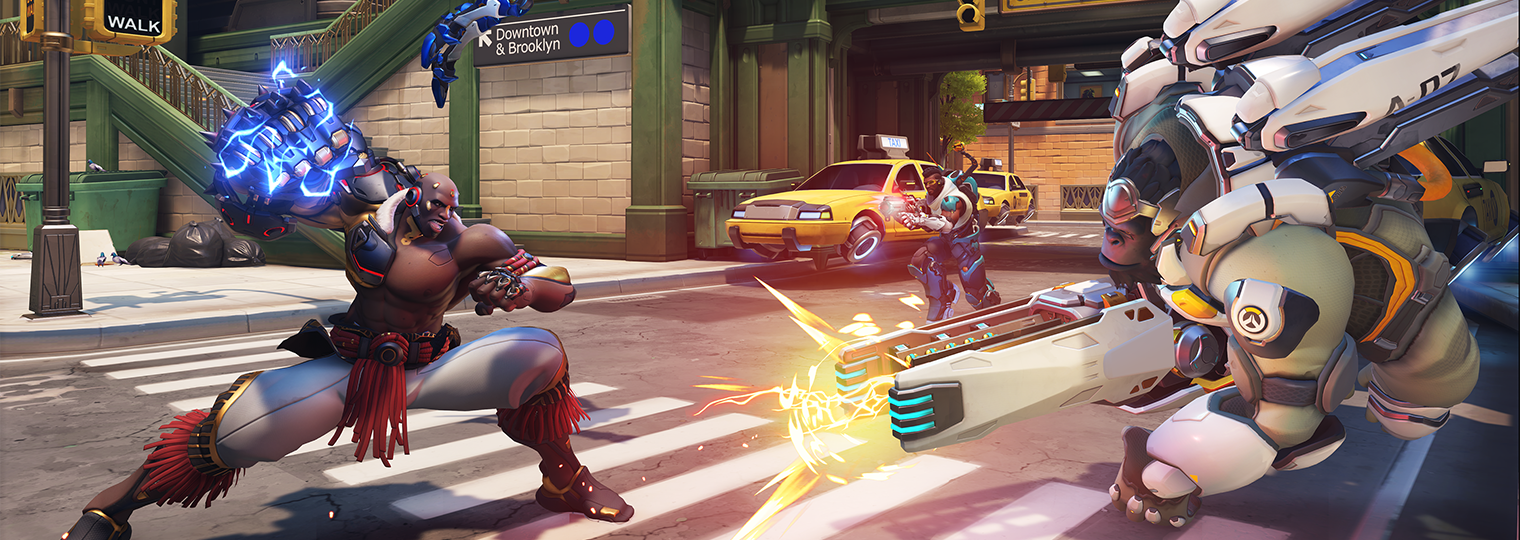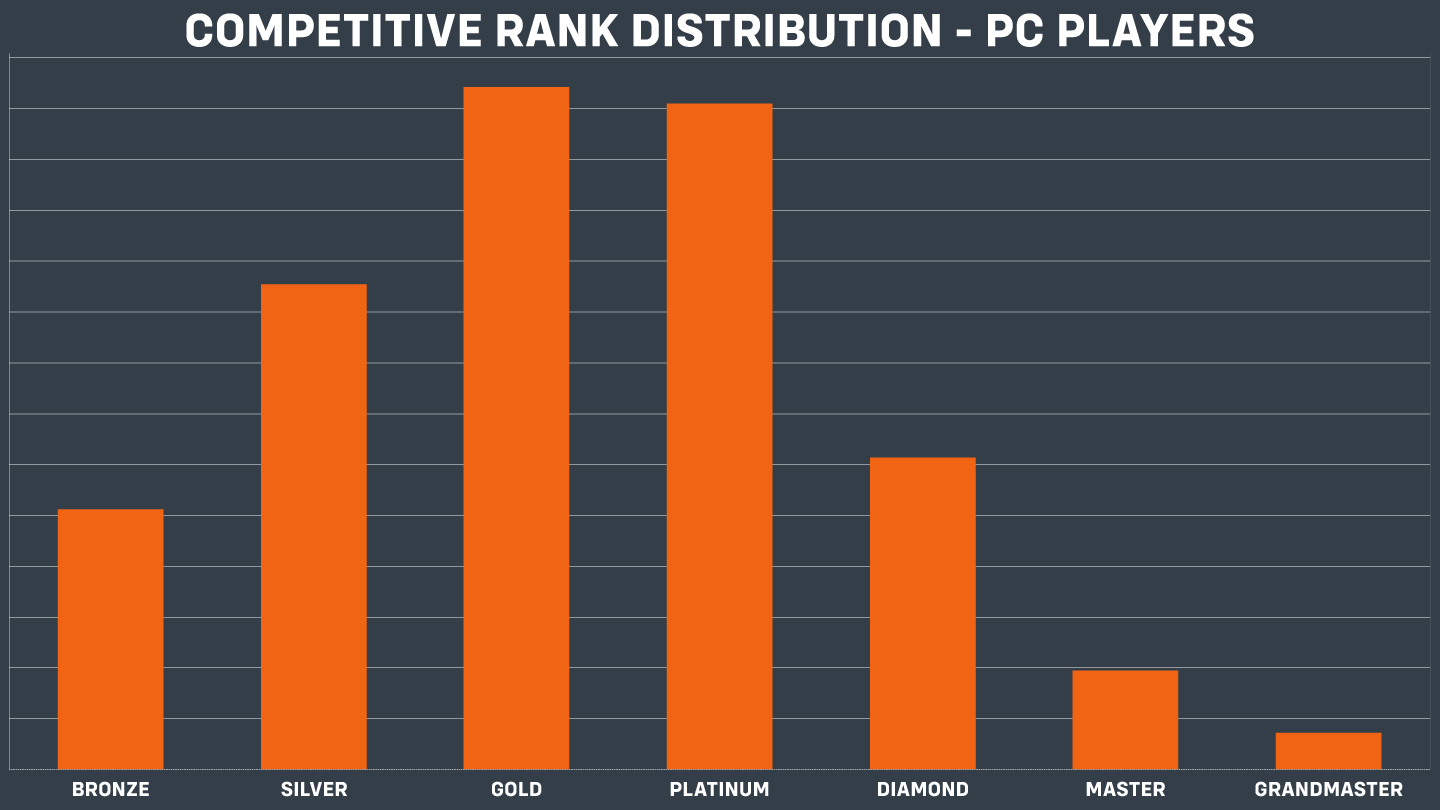
With Season 5 now underway, we’ll be bringing new improvements to Competitive Play, including matchmaking updates, bringing back a popular ranked game mode, as well as testing new ways for friends to play together regardless of their individual skill levels. Let’s look at where Competitive Play stands today and where we are looking to take it in the months to come.
Competitive Play Currently
For the last few seasons, we’ve been working to make improvements to matchmaking—with a focus on Competitive Play—in an effort to bring players of equal skill levels together. Notably, this season, we’ve started to prioritize placing similar groups with wide skill ranges into the same match: while this makes queue times a little longer for large groups, it helps to ensure a fair match.
In the previous season, we started to provide a matching rank (to show how close each player is to the overall average skill rating of the lobby), along with showing you where you stand in your skill division and how close you are to reaching the next rank. We hope this provides more transparency to your matches, as well as your progression as you continue to climb.
Game director Aaron Keller provided his thoughts around how one-sided gameplay can occur in his latest Director’s Take blog, and we are continuing to make changes as we find opportunities for improvement.
We also want to continue to provide you with Competitive experiences for different styles of play, which is why for all of Season 5, Competitive Mystery Heroes is back!
Calculating your skill rating after every match
Your internal matchmaking rating (or, MMR) is adjusted after every match, not just when you get your Competitive Update—it goes up when you win a game and goes down when you lose a game. However, how much it goes up or down is based on a variety of factors surrounding that match. Here are the three most important factors:
- What is your skill rating compared to your opponents’ rating?
- How new are you to Overwatch?
- How frequently do you play that specific Competitive mode?
To address the first bullet, a player that can beat a stronger team will have a greater increase in their internal MMR rating. The stronger the average matchmaking rating (MMR) of your opponents, the more challenging it should be to win the match. While it is important to keep the average MMR rating of both teams as close as possible, very rarely are they precisely equal. We want to make sure that we can deliver fast queue times for everyone at all times, so sometimes there may be a greater difference between the two averages.
Secondly, your experience and how much you are keeping up with your skills are also important factors. When a player is brand new and qualifies to play in Competitive Play, our matchmaking system has very little information to assess their skill level. In most cases, we can get a broad understanding of their current skill in as little as five games, which aligns to their first Competitive Update, but this is just a broad estimate, which is why new players will see their skill tier and division change frequently.
This takes us to the third bullet point. The same can also apply to returning players who have been inactive for some time, which is one reason why we remove their skill tier/division if they didn’t play in that Competitive mode or role for a whole season. Inactive players will have their MMR lowered during their absence. We'll also increase our uncertainty rating the longer the player is inactive. This uncertainty rating allows players to gain and lose MMR more quickly, so when the inactive player returns, they can jump back to their previous rank if they perform well, or they can lose MMR faster if their actual skill has decayed.
Whether you are a new player or someone returning to Overwatch 2 after an extended break, the key is to keep playing games. The more you play, the more information we will have, and the more confident the matchmaker will be about your current skill division and tier.
It’s these adjustments that change your MMR each game, and it’s with your current MMR that we determine what match is best for you every time you queue.
Keeping the ranks competitive
Going into Season 5, we’ve been seeing that there are more players in Grandmasters than in the past. This is happening for a few reasons. The biggest factor is that Overwatch 2 being free to play means we have more players coming in to play Competitive than ever before, and this shifting the distribution of ranks. For our top ranks, we’re seeing more players able to reach and maintain higher ranks than they have before.

This is a good thing as it shows that many of our players are growing in skill. In any case, we want to make sure we make the top ranks feel competitive. While we think this distribution of ranks is working well in general, both Grandmaster and Bronze reflect a very wide range of skill, and we want to make sure that skill is well-represented.
Specifically, we have found that more players have ended up in Bronze 5 than we want. This is mostly an unintended side effect of adding MMR decay for inactive players in Overwatch 2. We've started making incremental adjustments in Season 5 to enable more players to climb out of Bronze 5 in a way that doesn't upset the distribution of the curve. This is an issue we plan to closely monitor in future weeks and seasons.
Team Queue
As we continue to work toward more balanced and competitive matches, we don’t want to forget that the game is best played with friends working together. This can be a tough challenge when it’s important to maintain competitive integrity in our matchmaking.
In our main Competitive modes, we require players who group up together to be within a certain skill range of each other based on their skill tier and division. For Grandmasters, we cap the number of players who can group up to stacks of two. While these grouping restrictions work well for a good portion of our players, we still want to find ways to elevate full-team competition.
For Season 5, we are introducing Team Queue as a mid-season Competitive mode. This mode will require you to be in a full group of five players in order to queue, but there are no grouping restrictions whatsoever. This means a team composed of players with any combination of ranks can play with each other. Team Queue skill rating will be separate from your skill ratings in the competitive role queue or competitive open queue and only applies to you as an individual (which means you can change teammates at any time). The rule set for Team Queue will be role-locked to one tank/two damage/two support heroes, so plan in advance with your team and decide who will play each role.
We’re trying out Team Queue as a first step to improving the core Competitive experience for Overwatch 2 in the future. We considered alternate versions, including a solo-queue-only mode, but we wanted this to be a test alongside the availability of the current Competitive ruleset so as not to impact queue times in the main modes. Players should expect matches in Team Queue to be more challenging and play out differently due to having no skill rating restrictions. We look forward to hearing your thoughts on this limited-time mode, which will launch on July 11.
Thanks for your feedback, and thank you for playing! Be sure to let us know what you think of our changes, and we’ll be back next season with more updates on Competitive Play.